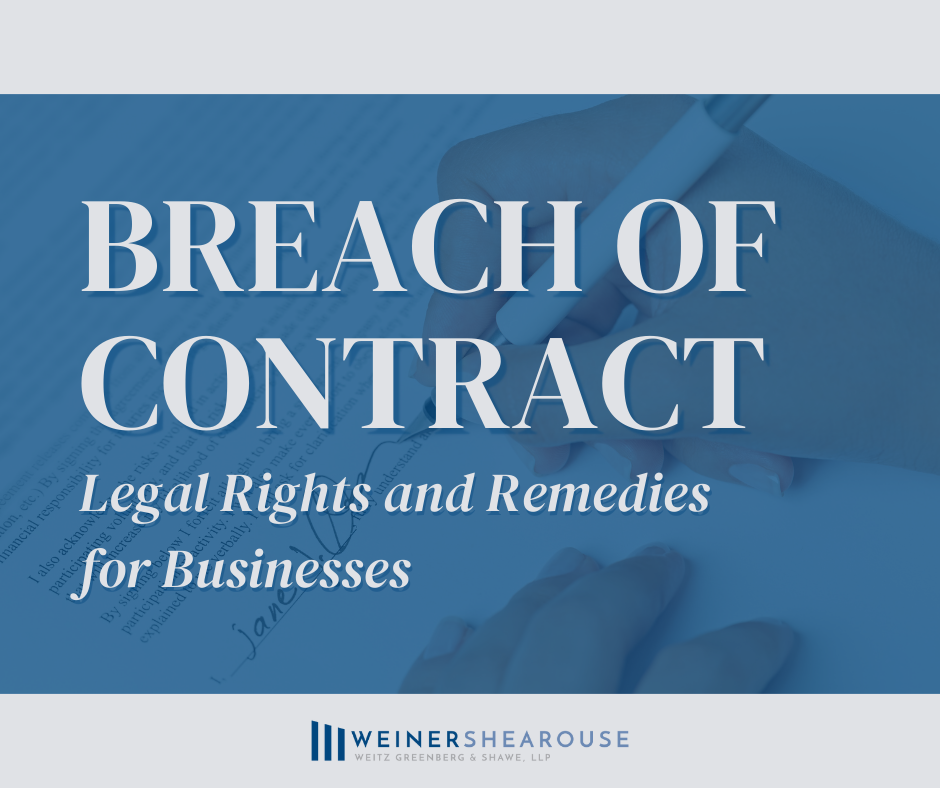Real estate development can be a highly rewarding venture, but also fraught with potential legal…

Breach of Contract: Legal Rights and Remedies for Businesses
Contracts are the foundation of trust and stability in business relationships. They establish expectations, define obligations, and protect both parties involved. Unfortunately, contract breaches are a common occurrence that can leave businesses facing financial losses and operational disruptions. However, businesses have legal rights and remedies at their disposal when a contract is breached.
What is a Breach of Contract?
A contract breach happens when one party fails to fulfill their obligations outlined in a legally binding agreement.
A few examples of breaches of contract are:
- Failing to Deliver: This is the most straightforward breach and the most common. The contract outlines the specific duties for each party, and if one party fails to deliver on an essential part of the agreement, it is considered a breach.
- Late Payment: Contracts often involve financial obligations. If a client is consistently late on payments or fails to pay altogether, they are breaching the contract.
- Violation of Confidentiality Clauses: This happens when the breaching party shares confidential information protected by the contract.
Contract breaches can be categorized as:
- Material Breach: Significantly impairs the other party’s ability to benefit from the contract.
- Minor Breach: Does not substantially hinder the other party’s ability to benefit from the contract.
Legal Rights of Businesses in a Breach of Contract
If you suspect a breach of contract, here are your legal rights:
- Terminate the Contract: Depending on the severity of the breach, you may have the right to terminate the contract and walk away.
- Sue for Damages: You can sue the breaching party to recover financial losses incurred due to the breach. This can include:
- Compensatory Damages: Aims to put your business back in the same financial position it would have been in if the contract had not been breached.
- Consequential Damages: Recoverable for foreseeable losses that stem directly from the breach. These can be more challenging to prove in court.
- Punitive Damages: Awarded in rare cases to punish the breaching party for egregious conduct, like intentional deception.
- Specific Performance: In certain situations, you may be able to seek a court order forcing the other party to fulfill their contractual obligations.
What Should Businesses Do if Faced with a Breach?
- Gather Evidence: Preserve all contract documents, communication records, and any evidence of the breach.
- Consult a Civil Litigation Attorney: Civil litigation attorneys understand the complexities of contract law and can advise you on the best course of action.
Appointing a Civil Litigation Attorney
Contract law can be complex, filled with legal nuances and potential pitfalls. An experienced civil litigation attorney can provide invaluable guidance, protecting your business from costly mistakes.
Civil Litigation Attorneys can help you:
- Assess the Situation: Evaluate the severity of the breach and potential damages.
- Negotiate a Settlement: Often, a negotiated settlement can be a faster and less expensive resolution than going to court.
- Represent You in Court: If necessary, your attorney will represent your business in court, presenting evidence and arguing your case for maximum compensation.
Closing Costs
Closing costs are additional fees associated with buying a home, often amounting in thousands of dollars. These can include taxes, origination fees for your mortgage, title insurance, and more. While the exact amount varies, a lawyer can provide a breakdown of these costs and ensure they’re allocated fairly between you and the seller.
By understanding your legal rights and taking decisive action, you can protect your financial interests and ensure justice is served. Contact your local Savannah lawyers, Weiner, Shearouse, Weitz, Greenberg & Shawe, today for a consultation. Our skilled civil litigation attorneys can help you navigate your breach of contract case and protect your business interests.



